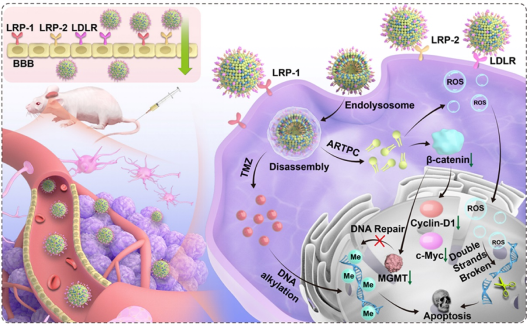A new research development on "drug-resistant glioma collaborative delivery therapy" was recently published entitled “Targeted liposomes for combined delivery of artesunate and temozolomide to resistant glioblastoma” in Biomaterials (IF=12.479) by Henan Key Laboratory of Brain Targeted Bio-nanomedicine.

Clinically, drug resistance and blood-brain barrier (BBB) penetration are the two significant issues with treating gliomas. Temozolomide (TMZ), the first-line clinical chemotherapeutic medication used to treat gliomas is the gold standard but has significant adverse effects when administered conventionally. Besides, a significant portion of high-grade and recurring gliomas are TMZ resistant, which leads to subpar postoperative chemotherapy outcomes and a bad prognosis for glioma patients. Studies have shown that TMZ and artemisinin can cooperate synergistically to treat gliomas, however, their co-administration to brain tumors is a great challenge.
Targeted nanomedicine delivery systems could achieve the precision treatment of multi-drug collaboration by medication co-loading in one nanosystem, in addition to the benefits of extending the drug circulation time, targeting the tumor lesions, and lowering the side effects of chemotherapeutic treatments.
Recently, the Henan Provincial Key Laboratory of Brain-Targeted Biological Nanomedicine developed an actively targeted nanoliposome based on artesunate phospholipids (ARTPC) co-loaded with TMZ for synergistic therapy of TMZ-resistant glioma. The design elements included the ApoE targeting peptide that gifted the liposome with the abilities of BBB traversal and accurate targeting into deep tumor foci. Secondly, the direct tethering strategy of artesunate (ART), potentially overcame the stability and co-loading issues of dual drugs associated with conventional liposomes. Pre-clinical results revealed that the nanoliposome could reverse TMZ resistance in glioma at a lower dose, effectively prolonging mouse survival with improved biosafety, and providing a new spotlight for the treatment of TMZ-resistant glioma.
Dr. Muhammad Ismail and Ph.D. candidate Wen Yang shared the first authors, and Prof. Shi and Prof. Zheng as co-corresponding authors. This work was supported by National Natural Science Foundation of China (NSFC 52073079, 32071388), the National Key Technologies R&D program of China (2018YFA0209800), Program of Technology Innovation Team in Colleges and Universities of Henan Province (21IRTSTHN028).
Henan Key Laboratory of Brain Targeted Bio-nanomedicine is supported by the College of Life Science and the College of Pharmacy, Henan University. In September 2015, the laboratory was established as HENU-MQ Joint Center of Biomedical Innovation, and was subsequently approved as Nano Biomedical International Joint Laboratory of Henan Province in 2016, Bio-Nano Medicine Disciplinary Innovation and Talent Introduction Center of Henan Province in 2018. It was then designated as a Key Laboratory of Henan Province in 2020 after receiving approval from the Department of Science and Technology.
The lab's work is concentrated on understanding the mechanisms behind brain disorders, creating novel diagnostic and therapeutic approaches, developing targeted therapies for brain disorders, and investigating new therapeutic targets and delivery mechanisms (Nature Communications, 2020, 11, 2978;Advanced Science, 2021, 2102001),development and application of brain diagnosis and treatment system (Advanced Materials, 2021, 202106082; Biomaterials, 2020, 229, 119576; Small, 2020, 2003654; Small, 2017, 3,1603966),brain delivery system Construction (Science Advances 2022, 8, eabm8011; Advanced Materials, 2019, 1903277; Advanced Materials, 2020, 2000416; Angew. Chem. Int. Ed. 2019, 58, 4938),preclinical evaluation and translation of brain-targeted nanomedicines (ACS Nano 2022, 16, 6293−6308; Science Advances, 2020, 6, eabc7031; Advanced Materials, 2018, 1803717; Advanced Materials, 2021, 2104779; Biomaterials, 2021, 276, 121036) a series of research results have been achieved in these areas. Also being invited to write a number of reviews on brain bio-nano-drugs (Trends in Biotechnology, 2018, 36, 562;Advanced Science, 2020, 8, 2101090; Advanced Functional Materials, 2020, 2005029), it has produced a great academic influence in China and abroad. The above achievements have effectively promoted the integration of biology and related disciplines and the development of " Biology plus".
Paper link: https://www.sciencedirect.com/science/article/pii/S0142961222002484?via%3Dihub



